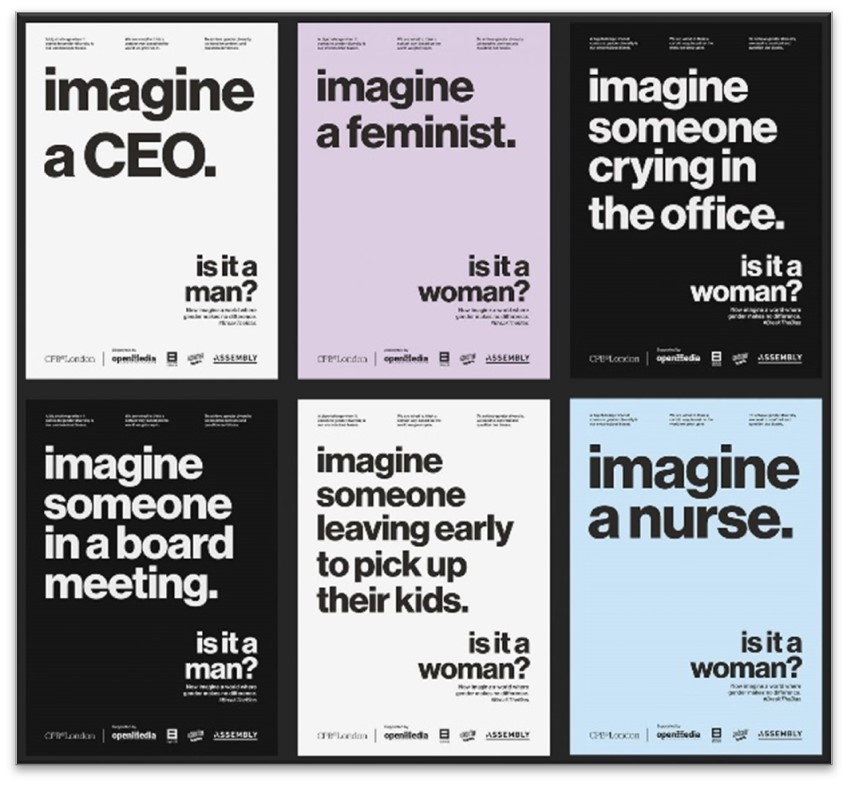
We are not saying that nothing positive (or well-intended) is happening beyond this one day – but we think: There’s still something to be done! Also read our blog post “Mini Me or Diversity? Numbers instead of anecdotes: Why diversity also pays off empirically“.
The reasons for the underrepresentation of women, people with a migration background, young or elderly people, people with disabilities or other minorities in management positions are complex. A very powerful factor, which at the same time is easily countered, is the unconscious bias of the people who are responsible for decisions in recruiting or promotions.
Is it our own fault? Or is it not our fault? Kind of both…
What is this actually supposed to be, this unconscious bias? Unconscious bias occurs when stereotypes about certain groups of people influence our perception of those people.
Too theoretical? A picture is worth 1,000 words, so try the following campaign from the UK for yourself:

Another great example of how unconscious bias works is this short video from Simon Fraser University.
Did we catch you guys? Don’t worry – you’re in good company. And that’s exactly the problem, especially in recruiting! As humans, we simplify our complex and ambiguous daily lives by creating certain simplified and generalized drawers based on (perceived) experiences, ( felt) knowledge, and third party opinions. We constantly and unconsciously open these drawers in order to quickly form an opinion about people – this is much faster and requires less cognitive capacity than always approaching everyone in an unbiased, open and free manner.
These pigeonholes represent our biases, and opening them automatically and unconsciously leads to over-interpretation, quick and unjustified judgments, and actions that go far beyond the objective information available.
Changing yourself is hard and uncomfortable – change the processes instead.
To counter these biases, training (e.g. Unconscious Bias Training, Diversity Training, Inclusive Recruitment Policies Training, etc.) is a standard solution in most organizations. However, scientific studies show that many of these programs either do not work or even have opposite, negative effects.
One explanation for this is, for example, that such measures implicitly convey to participants that they discriminate against others and thus generate resistance to the training program, or that the in-depth discussion of stereotypes makes them even more prominent among participants. In addition, training is often misunderstood as a one-off measure – but effective change here comes primarily through time, continuity, and systemic or organizational adjustments.
Of course, there are positive counterexamples. Well-designed and well-conceived measures, tailored to the specific organization and designed for the long term, which have a lasting effect and provide participants with concrete behavioral strategies. At the same time, reality shows that these account for a maximum of 10% of cases and require a high level of financial and time investment.
An effective and at the same time comparatively easy to implement alternative is to objectify the process of recruiting decisions.
Evidence-based recruiting ensures sustainable business success
This is where we – RELEVANT Managementberatung GmbH – come in. Evidence-based personality assessments make the difference in recruiting and promotion decisions. As #NerdsOnFire, we are confident about this. If you use objective, valid and fair personality assessments that provide sound data and open up new perspectives on applicants, you significantly increase the probability of selecting the most suitable candidates for a position. Especially when compared to the still omnipresent (and of course bubbling with unconscious bias) informal recommendations.
Relying on data-informed decisions in personnel selection also pays dividends on all diversity dimensions, not just gender. Recruiting the best requires not only the use of scientifically valid assessments, but also clearly defined job specifications. The interlocking of requirements profile and assessment has the effect of advancing effective leaders, avoiding “Mini Me” in recruiting, and achieving diversity.
It also allows us to identify personality traits that predict inclusive leadership, which are used to select or develop leaders. After all, even the best-developed diversity strategy is of no use if it is not supported and implemented by the relevant individuals. At RELEVANT, we rely on the scientifically based Hogan Assessments.
In a nutshell: You can use Hogan Assessments …,
… in the selection and promotion of all employees to increase diversity, recruit qualified candidates, and promote fairness in hiring. Using non-discriminatory assessments leads to increased diversity at all levels in the organization and lays a foundation for high-performing and diverse talent pools.
… to select, promote and develop leaders who create a diverse and inclusive environment.
… to provide feedback to employees and sharpen their strategic self-awareness of biases, blind spots, or the consequences of their behaviors that may be hindering your efforts around diversity, equity, and inclusion.
We will discuss the implications for recruiting in our presentation, “Mini Me or Diversity? Making Robust Recruiting Decisions with Hogan Assessments” at TalentPro (Content Stage 1) on July 06, 2022 at 4:50pm.
At RELEVANT, we relate data and personality to help companies make fair, robust decisions, leaders effectively create safe and humane environments, and everyone’s potential unfolds. If you’re looking to bolster your recruiting efforts with objective, fair, and valid data, reach out to us. As always, we’re just a phone call or email away.
References
- https://www.annualreviews.org/doi/abs/10.1146/annurev-psych-060221-122215
- https://www.economist.com/by-invitation/2021/05/21/frank-dobbin-and-alexandra-kalev-explain-why-diversity-training-does-not-work
- https://hbr.org/2021/09/unconscious-bias-training-that-works
- https://hbr.org/2016/07/why-diversity-programs-fail
- Mattingly, V., Grice, S. & Goldstein, A. (2022): Inclusalytics: How Diversity, Equity, and Inclusion Leaders Use Data to Drive Their Work
- Titelbild: https://pixabay.com/photos/exhibition-visitors-gallery-viewer-2944064/
Our Authors

Dr. René Kusch



